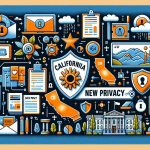
California’s New Data Privacy Rules: What You Need to Know
Major changes are coming to data privacy laws in California. Are you prepared for the impact?
The California Privacy Protection Agency (CPPA) is making headlines with its proposed regulations on automated decision-making technology. Set to affect businesses making significant decisions about employment, education, and healthcare, these rules would empower consumers by allowing them to know when their data has been used to make automated decisions. Additionally, consumers will have the right to opt out of such processes.
In recent legislative sessions, California introduced amendments to the California Consumer Privacy Act (CCPA), extending the definition of “personal information” to include data from artificial intelligence as well as neural data born from human biological activity. These measures aim to ensure that companies follow consumers’ opt-out requests during data transfers related to mergers or acquisitions.
Meanwhile, Texas is ramping up its enforcement of privacy laws, with the Attorney General’s office scrutinizing major technology firms like Discord and Reddit for potential violations concerning children’s data privacy. In a bold move, Texas filed a lawsuit against General Motors over the unauthorized sale of driving data.
New York is taking strides as well, enacting two laws designed to bolster online safety for minors. The New York Child Data Protection Act mandates that personal data of users under 18 requires consent for processing, thus reinforcing the need for safe online environments for children and teens.
As these regulations unfold, consumers and businesses alike must navigate this evolving landscape.
Implications of Revamped Data Privacy Laws
As California forges ahead with its ambitious data privacy laws, the broader repercussions on society and the economy are becoming increasingly clear. Empowering consumers through enhanced knowledge about automated decision-making presents a significant cultural shift, as individuals gain a stronger voice in how their data influences crucial life choices, from job recruitment to medical care. This shift fosters a culture of transparency, where companies may be compelled to reevaluate not just their data practices, but also their ethical approaches to automation.
On a global scale, California’s regulatory actions may set a precedent, influencing other states and nations to implement similar data privacy measures. For instance, as tech giants adapt to meet California’s rigors, they may be obligated to uniformly apply these standards internationally. This could reshape the global economy, leading to increased operational costs for businesses as they consider compliance strategies. Furthermore, as consumers grow more aware of data privacy rights, they may begin to prefer companies that prioritize ethical data handling, effectively driving market dynamics.
As the conversation around data privacy evolves, environmental considerations concerning digital activity are also surfacing. For instance, extensive data collection and processing contribute to energy consumption and carbon footprints, prompting a potential future trend of “green computing” where data managers implement eco-friendly practices. Ultimately, these regulations not only promise a more privacy-conscious society but hint at significant shifts in economic structures and environmental responsibilities that resonate throughout the 21st century.
Prepare for Major Changes: California Data Privacy Laws Set to Transform Consumer Rights
## Overview of New Data Privacy Regulations
The California Privacy Protection Agency (CPPA) is at the forefront of a significant shift in data privacy laws, particularly concerning automated decision-making technologies. These forthcoming regulations promise to impact businesses across various sectors, including employment, education, and healthcare. Under these new rules, consumers will gain unprecedented access to information regarding how their data is used in automated decision processes. This includes the ability to opt out of such usage, thereby enhancing consumer protection and control over personal information.
## Key Features of the New Regulations
1. Transparency in Automated Decisions: Businesses must disclose when automated technologies are used to make decisions that affect individuals. This move aims to demystify the algorithmic processes that often go unseen by consumers.
2. Expanded Definition of Personal Information: Amendments to the California Consumer Privacy Act (CCPA) now include artificial intelligence-derived data as personal information. This expansion encompasses neural data linked to human biological activity, forcing companies to adapt their data handling and privacy practices.
3. Consumer Opt-Out Rights: Consumers will have the right to request that companies cease using their data in specific automated processes. This is a substantial addition to consumer rights, especially in an age where data-driven decisions dominate various industries.
## Comparison with Other State Initiatives
While California leads the way, other states are also strengthening their privacy laws. Texas, for instance, has ramped up its enforcement efforts against large technology firms for potential breaches related to children’s data privacy. Notably, the Texas Attorney General’s office has initiated legal action against General Motors for allegedly selling driving data without proper authorization.
Meanwhile, New York’s recently enacted laws, such as the New York Child Data Protection Act, require explicit consent to process the personal data of users under 18, further solidifying protections for minors in the digital space.
## Use Cases for the New Regulations
These regulations will offer a framework for various stakeholders:
– Consumers: Individuals gain greater control and knowledge regarding their personal data usage, empowering them in today’s data-driven landscape.
– Businesses: Companies must adapt to these laws by implementing transparent data practices and ensuring compliance with consumer opt-out requests to avoid penalties.
– Legal and Compliance Teams: Organizations will need to strengthen their data governance strategies, necessitating collaboration between legal counsel and IT departments to navigate these complexities effectively.
## Limitations and Challenges
Despite the positive intentions behind these regulations, businesses may face challenges in compliance:
– Cost of Implementation: Adjusting systems and processes to meet new compliance















